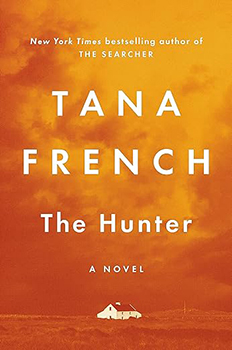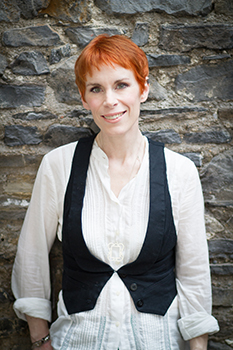Golden Ties That Bind…or Kill
The Big Thrill Interviews Bestselling Author Tana French
 Tana French’s new novel, THE HUNTER, is pure witchcraft. Opening the cover, you’re magically transported to Western Ireland for an afternoon of malarky and murder.
Tana French’s new novel, THE HUNTER, is pure witchcraft. Opening the cover, you’re magically transported to Western Ireland for an afternoon of malarky and murder.
Picking up two years after The Searcher, the triad of Cal, Lena, and Trey have formed the tenuous first bonds of a family. Patterns and routines are being established. The seeds of love and companionship have begun to sprout. And then Trey’s father, Johnny Reddy, comes back to town.
Johnny’s a hurricane of trouble, stretching at the relationships between not only Cal, Lena, and Trey but the entire town of Ardnakelty, with the Englishman and the promise of gold he brings with him. It’s only a matter of time before someone dies, leaving Trey, Cal, and Lena at odds with each other as they try to find out which of their friends is a murderer.
The Big Thrill was delighted to sit down with Tana to discuss genre-blending, father-daughter relationships, and how to write a successful slow-burn novel.
In the two years since The Searcher, Trey and Cal’s relationship has settled and solidified into a father-daughter relationship. However, Trey’s rapscallion of a dad, Johnny, comes back to town, and he begins to reassert his own father-daughter relationship, which sends Cal and Trey into turmoil. What made you want to explore the dynamics of father-daughter relationships?

© Jessica Ryan
By the end of The Searcher, Cal and Trey were going to be in a pseudo father-daughter relationship, which neither of them went looking for. There’s a lot of that in both of these books, which I think comes from the Western genre. People planning one thing, but other things get in the way. You just deal with what life throws you, which is very much a part of all Westerns.
And then in comes Johnny, who has claims on Trey based on blood. And, of course, blood isn’t something you can ignore. Trey would like to leave until Johnny does whatever it is that he wants to do in this place and wanders off again, but she can’t. So, she decides she’s going to use this relationship with her dad to get the revenge that she’s been wanting [since the end of The Searcher].
Johnny’s very much trying to use Trey against the village, and Trey turns that around on him. Their relationship becomes much less “father-daughter” and much more “two people who are chained together.”
You’ve said in other interviews you thought The Searcher was a stand-alone novel. What compelled you to revisit Ardnakelty?
There was more candy in the pinata. I think both of these books [The Searcher and THE HUNTER] are Mystery [genre] software running on Western [genre] hardware. I’d been reading Westerns and kept thinking about how much in common the Western settings have with the settings of the West of Ireland. It’s got that wild, harsh beauty that demands real mental and physical toughness from anyone who wants to make a living out of it. Culturally and geographically, it’s very distant from the centers of power. If they want a cohesive, functioning society, they’re going to have to come up with their own rules and enforce them themselves, and that’s very Western. But it’s also something that shows up a lot in Irish dramas set in the West.
In The Searcher, we have the “stranger coming to town,” and he walks into the saloon, and things are going to change around him. Then I thought about the trope of “there’s gold in them thar hills.” And it’s not as implausible in Ireland as you think. There have been huge numbers of ancient gold artifacts found in Ireland, and there have been little mini gold rushes over the centuries. We even still have companies exploring various mountain ranges for gold.
In some ways, Trey’s absent father was exactly the kind of guy who would only come home if he had a big get-rich-quick scheme that would make…him an important guy. That matched really well with the gold rush trope, so [Trey’s father] came home bringing up a potential gold rush.
Speaking of Trey’s father, in a 2019 interview with the Irish Times about your novel The Witch Elm, you said, “I had been thinking a lot about luck and empathy and the connection between the two, how having too much luck can stunt the development of empathy.” Did you have this in mind when you were writing the character of Trey’s father, Johnny?
I think it’s a little bit the other way around. [Ardnakelty] is a very tight-knit community, and your role is determined basically before you’re born because all the relationships go back generations. Johnny comes from the Reddy family, and they’re basically considered to be wasters.
I think most small towns have that family who isn’t really considered to be within the fold, and Johnny’s been fighting against that [stereotype] his entire life. In a weird inverse way, that impaired his sense of empathy because he has to be in a battle of wits with everything around—both on the defensive and on the attack at the same time—and things have never quite come together for him. He’s trying to make luck but can never quite put his finger on how to do it.
Parts of this book read very much like an episode of Survivor due to the insularity of the town of Ardnakelty. Alliances made and broken. Are you in our alliance? And what are you willing to do to stay in? There are sharp-edged rules keeping Cal (and, to a degree, Trey) inside the group, as well as keeping the outsiders away. In a way, Mart is an avatar for the social rules, giving them a voice and the town a character all its own. Was that a deliberate decision or a natural evolution as you wrote?
What you’re talking about is the way small towns create and enforce rules. It’s not like living in a city. In a small town, any decision you make has a ripple effect, even if you don’t want it to. So, there have to be rules, and this place has very, very rigid ones, and Mart is the person who spells that out.
Mart comes across like a jovial kind of guy. But there is this hardness below the surface telling you his laughter isn’t really a joke.
I wanted that combo. In The Searcher, I initially threw him in because I thought we needed somebody who was a lighter character who would provide flavor; someone to provide the local style of banter and the local who’s at ease in this place. Then, I realized he was much more interesting than that, and there were many more interesting things I could do with him. But that combination is something I wanted—the idea that you can be at once just at ease within the townlands, have relationships, have that sense of humor, and at the same time have a core of steel.
You’ve said in other interviews you’re not a big believer in genre boundaries. Why is that? And how do you blend and blur them to tell the story you want?
Obviously, I’m operating within the mystery genre. And the thing about mystery is that…the genre conventions have been done really beautifully for a long time. There are people, like Agatha Christie, who have polished all those conventions to an absolute shine. And when they’ve been done so beautifully…genre conventions become something interesting to play with. They become a starting point rather than an end point.
It becomes okay to start with a basic idea and ask, “how can I stretch it?” How can I play with it? How can I mix and match it within a larger gothic western? How can I expand on it? What else could I do with it? I turn it inside out and upside down, and I love that. I love the potential that it gives to the genre.
It’s almost a rule that the modern mystery novel must start with finding the body or an action scene to hook the reader. THE HUNTER starts with Trey bringing a chair for her and Cal to mend. It’s the ultimate slow-burn novel. What is the key to hooking your reader when writing a slow-burn novel?
For me, it’s all about the characters. It’s all about who these people are, what their relationships are, what the things are that could lead to the enormous earth-shaking decision of one person killing another.
Usually, the mystery structure starts out with a dead body, and then you gradually unravel, going backward. But I think that if you get people deeply engaged with the characters, you can sow all the seeds that lead to murder; build out all the threads being intertwined until the murder happens. If your readers are involved in these characters and care about them, they are fascinated in the factors that lead to the murder.
What’s next? Are you thinking about going back to Ardnakelty for a third book with Cal, Lena, and Trey?
I felt like the arcs, both thematic arcs and character arcs, hadn’t really been completed by the end of THE HUNTER. The Searcher was about the outsider. THE HUNTER is about people—Cal, Trey, and Lena—who are on that periphery, between outsider and insider in this weird sort of Borderlands. I felt like there needed to be a book about being within this circle, and so I’m working on that now.
The Big Thrill Interviews Bestselling Author Tana French










